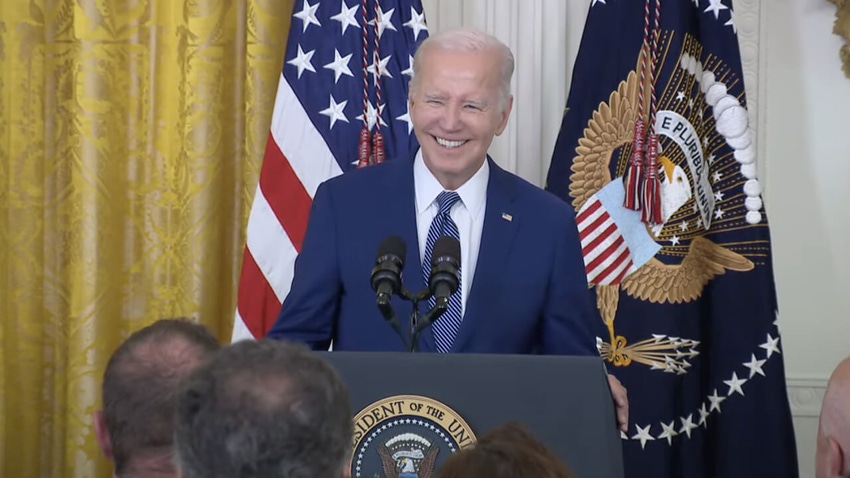White House announces over $40B for broadband deployment
The $42.5 billion Broadband Equity Access and Deployment (BEAD) program will see Texas receive the largest sum, at $3.3 billion, followed by California ($1.8B) and Missouri ($1.7B) to build high-speed Internet.

The White House on Monday announced how the federal government will distribute over $40 billion in funding for broadband through the $42.5 billion Broadband Equity Access and Deployment (BEAD) program. According to numbers released by the Biden administration, the most funding will go to the state of Texas, at $3.3 billion, followed by California ($1.8 billion) and Missouri ($1.7 billion).
"With this funding, along with other federal investments, we're going to be able to connect every person in America to reliable, high-speed Internet by 2030," said President Biden at a White House event. According to the administration, 24 million Americans currently lack high-speed Internet due to a lack of access or inability to afford service.
Funding allocations for BEAD have been long awaited since the administration disclosed rules for the program that would see each state get an initial $100 million with further funding to be allocated based on their unserved locations, according to the FCC's national broadband map. The BEAD program also distributed several billion dollars in planning grants to help states create broadband offices and conduct necessary work to assess their broadband deployment needs. The remaining funds – $41.6 billion, according to numbers released today – will be used primarily to deploy last-mile fiber-optic networks. Below are the ten states set to receive the most funding.
State | BEAD Funding Amount |
Texas | $3,312,616,455.45 |
California | $1,864,136,508.93 |
Missouri | $1,736,302,708.39 |
Michigan | $1,559,362,479.29 |
North Carolina | $1,532,999,481.15 |
Virginia | $1,481,489,572.87 |
Alabama | $1,401,221,901.77 |
Louisiana | $1,355,554,552.94 |
Georgia | $1,307,214,371.30 |
(Source: NTIA. Click here for a full list of funding allocations.) |
The NTIA, which oversees BEAD, was expected to make state BEAD allocations by June 30, and said today that states will "receive their formal notice of allocation" on that date. Today's announcement by the White House kicks off a week of events publicizing the investments of the $1.2 trillion Infrastructure Investment and Jobs Act (IIJA) passed in 2021.
With funding allocations set, states will have 180 days to submit their draft BEAD proposals to the NTIA outlining how they will structure their grant programs. Once approved by the NTIA, states can request access to "at least 20 percent of their allocated funds," said the agency in a press release. Some states, like Louisiana, have already published their plans for public comment.
The NTIA is also finalizing rules for BEAD state challenge processes, whereby states will conduct a review to finalize their list of locations eligible for grant funding.
Other open questions
Meanwhile, a series of additional open questions still remain that will impact the future of the BEAD program and broadband industry. They include how the federal government will interpret "Buy America" rules for BEAD, the future of the Affordable Connectivity Program (ACP) and whether Congress passes a law exempting BEAD grants from taxation.
On Buy America, President Biden has repeatedly committed – including during today's ceremony – to adhering to Buy America rules for all federal infrastructure programs. But the industry has pushed back, calling strict adherence infeasible due to a lack of domestic supply of network components. As such, the NTIA released guidelines for the $1 billion Middle Mile program that waived Buy America rules on routing and switching equipment, microwave backhaul, optical fiber transport equipment and undersea cable equipment but applied them to fiber optic cable. Industry stakeholders are expecting similar rules will apply to the BEAD program.
Another great unknown for the future of the BEAD program is whether Congress will renew funding for the Affordable Connectivity Program (ACP), which is helping to subsidize broadband for nearly 19 million low-income households. In recent weeks, NTIA Administrator Alan Davidson and FCC Chairwoman Jessica Rosenworcel have both testified before Congress that not doing so will have an adverse effect on the BEAD program. Last week, a group of Senate Republicans floated a temporary solution in a letter to the White House that would see President Biden use unspent COVID relief funds to extend the life of the program while Congress debates its future.
Biden briefly discussed the ACP's importance at Monday's event, noting: "We're working with Congress to extend this bipartisan program."
And on broadband taxes, the industry is looking to Congress to exempt BEAD grants from being treated as gross income, and thus taxation. Industry groups including USTelecom warned the federal government in a letter last year that current law will require ISPs to return "as much as 21 percent" of their grants to the Treasury Department, leaving "millions of Americans without access to the broadband they were promised." As such, several groups are pushing lawmakers to pass the Broadband Grant Tax Treatment Act, which "excludes from gross income, for income tax purposes, certain broadband grants made for broadband deployment," according to a bill summary. That bill was reintroduced by Sen. Mark Warner (D-VA) in February, with bipartisan co-sponsorship, and referred to the Finance Committee, but no further action has been taken since.
"It is utterly vital that Congress move to eliminate this tax," USTelecom CEO Jonathan Spalter told Light Reading during a recent episode of The Divide podcast. "I'm confident that Congress will have the wisdom but also the courage to make sure that this tax is eliminated so that all of these dollars, not just 80% of these dollars, can go to where they're needed most, which is getting broadband extended to every household, every business in America."
Related posts:
About the Author(s)
You May Also Like












